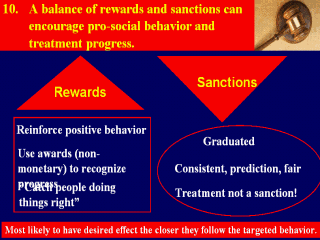 |
Treatment does not need to be voluntary to be
effective. Strong motivation can facilitate the treatment process. Sanctions
or incentives related to family, employment, or the criminal justice system
can significantly increase treatment entry and retention rates and the
success of drug treatment interventions. It is important to use rewards and
sanctions to encourage pro-social behavior and treatment progress. Research
has shown that using rewards to recognize progress is the most effective way
to change behavior. Rewards can take many forms, including certificates of
achievement or verbal praise from an authority figure such as a judge.
Establishing an attitude of “catching people doing things right” creates a
positive environment for fostering and maintaining behavior change.
When sanctions are used, it is important for offenders to perceive them as
consistent, predictable, and fair. Sanctions should increase in severity as
the behavior escalates. Most importantly, treatment is not a sanction but a
service designed to help the offender build a meaningful and productive life
in the community.
|
